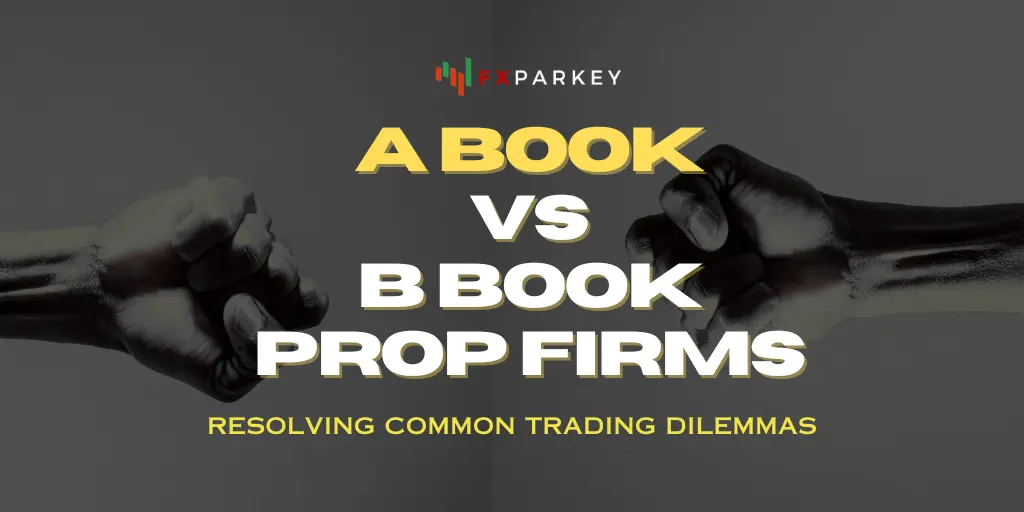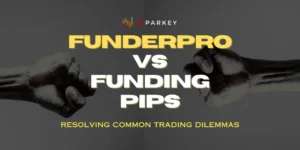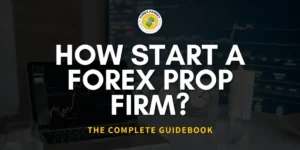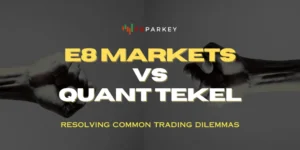
If you’ve ever searched for “A Book vs B Book Prop Firms” and felt like you were trying to solve a riddle in a foreign language, you’re not alone. This guide is here to cut through the jargon and give you the clarity you need before diving into the world of forex proprietary trading.
Beyond the Charts ➜ Addressing Critical Concerns of Modern Traders
Let’s face it—getting paid is the ultimate goal. So, which model ensures your profits land in your account without drama?
The comparison between A Book and B Book Prop Firms matters because it directly impacts how traders experience payouts, trade execution, and trust in the firm they work with. By understanding the key differences, you'll learn how these firms handle your trades—whether they send them to the market or keep them in-house—and how that affects your profits.
This article will show you which type of firm aligns with your trading goals and why some traders swear by A Book firms while others cautiously approach B Book firms. You'll also get insights into common complaints like payout delays, conflicts of interest, and transparency issues so you can avoid costly mistakes.
If you're serious about choosing the right forex prop firm, this comparison will give you the clarity you need to make smarter decisions.
A Book Vs B Book Prop Firms: Trading 101

A Book Prop Firms
Routes trades directly to liquidity providers without taking the opposite side. Profits from commissions and spreads rather than trader losses, creating better alignment of interests.
B Book Prop Firms
Acts as counterparty to traders' positions, essentially betting against them. Profits directly from trader losses while offering faster execution and fixed spreads.
Still Not Clear On What Does “A Book” Even Mean?
Think of an A Book prop firm like a restaurant that doesn’t grow its own ingredients. When you order a burger, they source the patty, bun, and toppings from external suppliers, add a little seasoning, and serve it to you.
The restaurant makes money by marking up the price—essentially charging a commission for connecting you with the ingredients. Similarly, A Book Prop firms send your trades directly to the market or liquidity providers.
A Books profit from the spread or commission on each trade, without taking the opposite side of your bet. This setup aligns their interests with yours: they want you to trade more because that’s how they earn.
What's a “B Book” Firm then in Today's Market?
A B Book firm is like a casino that doesn’t send your bets anywhere—they keep them in-house and act as the dealer. When you place a trade, the firm takes the opposite side, meaning if you win, they lose, and if you lose, they win. Instead of routing your trades to the market, they hold them internally and hope you don’t walk away with profits.
This setup can be profitable for the firm but raises trust issues because their success depends on your losses. Some traders worry about shady practices like manipulating prices or delaying payouts since the firm has a vested interest in keeping your money. While not all B Book firms are bad, this model often makes traders skeptical about fairness.
A Book vs B Book: Quick Comparison Table
| Feature | A Book Firms | B Book Firms |
|---|---|---|
| Trade Execution | Sent to the market/liquidity providers | Held internally by the firm |
| Profit Model | Earns from spreads and commissions | Profits when traders lose |
| Conflict of Interest | None—aligned with trader success | High—firm benefits from trader losses |
| Transparency | High—market-based pricing | Lower—prices controlled by the firm |
| Trust Factor | Trusted by professional traders | Viewed with skepticism by many traders |
Mike’s $50k Nightmare: Why A Book Firms Outshine B Book Firms Every Time?











Here’s a story for you.
I knew a trader, let’s call him Mike. Mike joined a B Book prop firm because they were offering some sweet deals—low fees, fast payouts, all the usual promises. He started with $5k, and within three months, he flipped it into $50k. The guy was on fire.
But when he requested his payout, the firm suddenly found “issues” with his trading. They claimed he was “exploiting market conditions.” What does that even mean? Isn’t that the whole point of trading? Long story short, they refused to pay him a dime, and Mike walked away with nothing but frustration.
After that mess, Mike switched to an A Book prop firm. No flashy promises, no gimmicks—just straightforward trading. He didn’t have to worry about someone rooting for him to fail or making up excuses to avoid paying him. He’s been with them for years now, and every payout hits his account like clockwork.
The moral? Sometimes it’s better to go with a firm that wants you to succeed rather than one that profits when you lose. Sure, not all B Book firms are bad, but stories like Mike’s are why traders are cautious.
Comparing Average Trader Longevity in A-Book vs B-Book Prop Firms
Trader longevity—the time traders stick with a firm—differs significantly between A-Book and B-Book firms. Industry reports suggest that traders at A-Book firms tend to stay longer, as these firms align their success with the trader’s profits. With transparent pricing and reliable payouts, traders feel more secure and are less likely to leave due to trust issues.
In contrast, B-Book Prop firms often see shorter trader lifespans. Many traders quit after experiencing payout delays, conflicts of interest, or suspicions of price manipulation. Reports highlight that 80–95% of traders lose their initial deposits within six months at B-Book Prop firms, which plays into the firm’s profit model but drives away dissatisfied traders.
This comparison underscores why trust and transparency matter—traders are more likely to stick with firms that prioritize fairness over profit from losses.
How A Book vs B Book Changes a Firm’s Support for Your Success?
| Aspect | A Book Firms | B Book Firms |
|---|---|---|
| How They Earn Money | Earns from spreads and commissions, regardless of whether you win or lose. | Profits directly from your losses; loses money when you win. |
| Incentive to Support You | Strong incentive to help you succeed since more trading volume = more revenue. | Minimal incentive to support your success as your wins reduce their profits. |
| Payout Reliability | Payouts are consistent because they don’t lose money when you profit. | Payouts may be delayed or denied if you’re too successful. |
| Conflict of Interest | No conflict—your success benefits the firm. | High conflict—your success hurts the firm’s bottom line. |
| Trader Experience | Focused on building trust and long-term relationships with profitable traders. | Often attracts inexperienced traders who are less likely to succeed long-term. |
Why Do A-Book Firms Proudly Display LP Logos, While B-Book Firms Hide Them?
| Aspect | A-Book Firms | B-Book Firms |
|---|---|---|
| Transparency | Proudly display liquidity provider (LP) logos to prove trades are routed to the real market. | Avoid showing LP details, often claiming it’s “confidential” to hide internal trade processing. |
| Trade Execution | Trades are sent directly to external liquidity providers, ensuring genuine market pricing. | Trades are held internally, mimicking market conditions without external routing. |
| Trust Factor | Builds trust by openly sharing connections with reputable financial institutions. | Raises suspicion due to lack of transparency and potential conflicts of interest. |
| Conflict of Interest | None—firm earns from commissions and spreads, not trader losses. | High—firm profits when traders lose, creating a direct conflict of interest. |
| Trader Appeal | Attracts experienced traders who value fairness and market access. | Targets less-informed traders with flashy promises and low costs. |
A-Book firms embrace transparency because their business depends on trust and fair execution, while B-Book firms often avoid scrutiny by keeping their operations opaque.
What Psychological Biases Make Traders Ignore B-Book Risks?

Let’s be honest—traders aren’t always rational, especially when flashy promises are involved. One big bias is confirmation bias. If a firm offers ridiculous profit splits or guarantees easy payouts, traders often focus on the positives and ignore warning signs, convincing themselves it’s legit because it matches what they want to believe.
Another culprit is overconfidence bias. Many traders think they’ll outsmart the system, assuming they’ll be the exception who beats the odds, even when the firm profits from their losses.
Then there’s loss aversion. Some traders stick with B-Book firms even after spotting red flags because they’ve already invested time and money and fear walking away empty-handed.
These biases make it easy to overlook risks, but ignoring them can lead to costly mistakes. Recognizing these mental traps is key to making smarter decisions and avoiding shady firms.
Queries You Might Have for A Book and B Book Prop Firms
What is the difference between A Book and B Book Firms?
A Book firms send trades to the market, while B Book firms hold trades internally as the counterparty.
How do A Book Prop Firms make Money?
A Book firms earn through spreads and commissions, regardless of whether traders win or lose.
Why are B Book Prop Firms considered risky?
B Book firms profit from trader losses, creating potential conflicts of interest and trust issues.
What are the Benefits of Trading with A Book Prop Firms?
Transparency, reliable payouts, and alignment with trader success are key advantages of A Book firms.
How do B Book Firms handle Payouts?
B Book firms may delay or deny payouts, especially if traders are highly successful or violate vague rules.
Can I Trust A Book Prop Firms more than B Book Prop Firms?
Yes, A Book firms are generally more trustworthy due to their transparent practices and lack of conflicts of interest.
What Should I look for in a Reliable Prop Firm?
Seek transparency, clear payout policies, reputable liquidity providers, and positive reviews from other traders.
How do A Book Firms ensure Transparency?
They display liquidity provider logos and offer market-based pricing to build trust with traders.
What are common complaints about B Book Firms?
Traders often report payout delays, price manipulation, and lack of transparency in trade execution.
How can I avoid B Book Firms?
Check for high profit splits, absence of liquidity provider details, and overly aggressive marketing tactics.
Choosing the Right Type of Forex Prop Firm for You
The A Book vs B Book Prop Firms debate boils down to one question: Do you prioritise trust or cost?
A Book Prop firms offer transparency, reliable payouts, and alignment with your success by routing trades to real markets. B Book Prop firms lure traders with lower fees and faster execution but risk conflicts of interest and payout headaches.
If you value fairness and long-term growth, A Book’s market execution and proven liquidity providers are worth the slightly higher costs. For short-term strategies, B Book might work—but always vet their terms and track record.
Remember, a firm’s profit model shapes how they treat you. Look for red flags like vague liquidity details or overly generous profit splits. Whether you’re scalping or swing trading, understanding A Book vs B Book dynamics ensures you pick a partner that won’t sabotage your gains.
Stay sharp, choose wisely, and trade confidently.


![Secure the Bag Coupons & Discount Codes 2025 ➤ $367 OFF [50% OFF] 16 Secure the Prop Coupons and Promo Codes](https://fxparkey.com/wp-content/uploads/2023/12/Secure-the-Coupons-Promo-Codes-300x150.webp)



